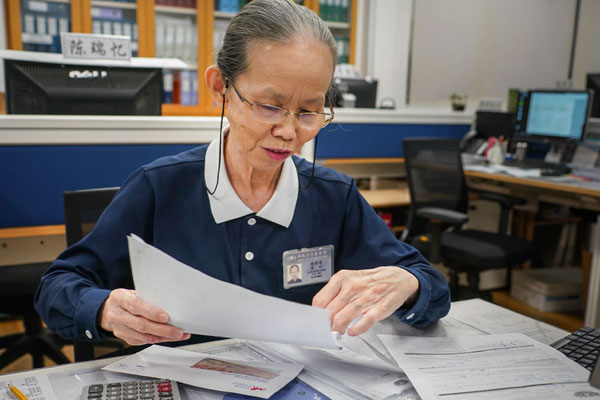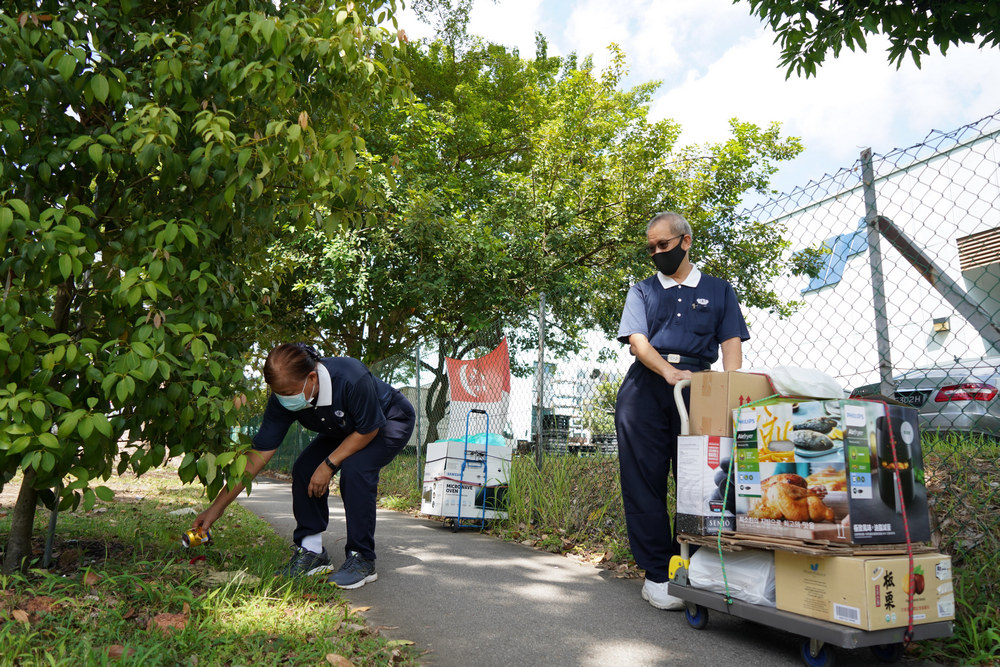 (Photo by Pang Lun Peng)
(Photo by Pang Lun Peng)
Different people have different perceptions and standards of what is right or wrong. In the world of Tzu Chi, we often hear people say, “Just do what is right!”
“How do we determine whether something is right or wrong?”
This question used to linger in Kaw Mui Kooi’s mind…...
41-year-old Kaw is a hair stylist cum Tzu Chi volunteer who makes a living by operating a home-based hair salon in Joo Chiat Place. I conducted this interview in her home. After stepping into her house, I was greeted by the sight of a neat and tidy mini hair salon with only two mirrors and two chairs. There were two armchairs and a coffee table behind the chairs, and the space served as a reception area for guests.
Kaw had always thought that everything she did in the past was right
Kaw was brought up in a family where she was taught to always put others’ feelings before hers. She used to have the perception that it was “selfish” for one to love oneself. Thus, before she got married, she managed her relationship by putting others before herself, and she continued to do so after getting married.
However, questions like “Why being kind to others is not necessarily appreciated?” and “Why is it never enough even after I have done my best?” kept lingering in her mind…
Her continual contributions and sacrifices for the family were often taken for granted without appreciation by her significant other. Although she was only hoping for some respect in return for her contributions, more often than not, her wish was not fulfilled.
The misfortunes and injustice that Kaw suffered in her marriage eventually led her to vent her inner frustrations and pain through self-abuse. Recalling the painful past memories, she stretched out her left arm and revealed the scars on the lower end of her arm.
“I took a pair of scissors from the kitchen and started stabbing myself, making three holes over here, and blood started oozing out. Honestly, when the scissors pierced through my skin, I didn’t feel any pain in my flesh. Instead, my heart was aching so much that I couldn’t hold back my tears, and I cried profusely. When I was in the ambulance, the nurse kept asking why I was crying and comforted me.”
She remembered that after the incident, her younger sister, who was still working as a staff in Tzu Chi Malacca, gave her a book titled “Do What Is Right”, which is authored by a Tzu Chi volunteer in Taiwan. And it prompted Kaw to ponder on how to determine what is right; at that time, she still believed that what she had done in the past was right.
In order to find the answers to various questions about life and hoping to end her misery, she read every single word of the book, from the beginning till the last page. But unfortunately, she couldn’t really grasp what the author was trying to express as she was very lost; she was stuck in her negative thoughts and felt as though her mind was “blocked”. She couldn’t get the message from the book even though she believed that it contained the answers to her questions.
Despite that, she bore in her mind the inspiring title of the book, “Just Do It”, and it was sufficient to keep her going.
Action speaks louder than words
In 2009, she stepped into Tzu Chi Singapore’s Jing Si Hall and became a Tzu Chi donating member. Several years later, she returned to become a volunteer. As a trainee volunteer now, she actively participates in the various Tzu Chi activities, such as the Chinese book club, monthly recycling programme, home care visits, etc.
She started stepping out of her home and leaving the “small, limited love” behind. “I have no other friends after meeting my husband, and this is ‘limited love’,” she explained.
Kaw always brings her children along to the monthly recycling activity. “I told them that the reason we are going to Tzu Chi activities is because they need to learn, while I need to change myself,” she said.
She hopes that her children can “learn while doing and awaken to the many truths of life while they learn”. She fully agrees with this teaching by Dharma Master Cheng Yen.
“During school holidays, I will ask my children to help with household chores. Once, after my daughter had wiped the cupboard continuously for a few days, she came to me and said, ‘Mum, don’t mess up the things over there!’ And I replied, 'Good! You’ve finally learned it now! Because if you are the one doing the cleaning, you will not want others to mess up the place!'”
This interaction between the mother and daughter is an apt reminder of the Jing Si Aphorism, “We can talk about something a thousand times, but nothing can be achieved unless we take action.”
Kaw remembered that once, after participating in a Tzu Chi recycling activity two times, her daughter came to her and asked her why she always looked so happy when she went to the recycling point.
The question that came out of the blue from her daughter inexplicably touched her heart. She was surprised to see that even her own child was able to feel the happiness that was exuding from her.
 Kaw’s daughter and son gently rubbing some soothing lotion onto her hands during a Tzu Chi parent-child bonding event (Photo by Chan May Ching)
Kaw’s daughter and son gently rubbing some soothing lotion onto her hands during a Tzu Chi parent-child bonding event (Photo by Chan May Ching)
It is entirely up to us to choose what we want in life
In Tzu Chi, Bamboo Coin Banks are no stranger to the volunteers. And there are a few of such coin banks in Kaw’s hair salon. She shared, “To me, a Bamboo Coin Bank symbolises a form of spiritual cultivation. This is because I will insert coins into it daily, and when I do that, I will make a wish to give blessings to myself and others. Whenever my customers ask about the coin banks, I will take the opportunity to introduce Tzu Chi to them.”
Most hair salons provide a variety of fashion magazines and comics for customers to keep themselves entertained while getting their hair done. Yet, there are only copies of Tzu Chi Monthly and books of Jing Si Aphorisms on the small wooden shelf in Kaw’s hair salon.
“I hope my customers can read the Jing Si Aphorisms when they are seated. Sometimes, when they are in a bad mood, perhaps one of the Aphorisms may be helpful to them. I hope that they would take the opportunity to ask me what the books are about, so I can start telling them about Tzu Chi.”
 Kaw created a sense of “Tzu Chi ambience” in her salon, providing a peaceful and comfortable environment for her customers. (Photo by Pang Lun Peng)
Kaw created a sense of “Tzu Chi ambience” in her salon, providing a peaceful and comfortable environment for her customers. (Photo by Pang Lun Peng)
It is not an easy task to introduce Tzu Chi to others or to recruit Tzu Chi members. The process is bound to be filled with challenges as not everyone would accept its philosophy and Missions; those who disagree may even argue back.
She confessed, “Previously I was worried that some customers might not patronize me anymore after I shared with them about Tzu Chi, and indeed there were such customers! At that time, I was afraid and worried that doing so might affect my business. However, I told myself: ‘Just do whatever is right’. I never forced my customers to support Tzu Chi as I was only sharing about it with them. If they don't accept what I share, it is perfectly fine with me, because everyone is free to decide for themselves.”
After experiencing the many ups and downs of life, Kaw has come to realise that it is entirely up to us whether we wish to be happy or suffer in life, and that it is also our decision whether to cling onto something (and suffer as a result) or to let go of it.
“We can choose to be a victim or to walk out of the plight,” said Kaw.
Perhaps many people may be asking the same questions as those Kaw used to have, and are doubtful whether there are many people in this world who are actually content with life. In the past, she was constantly grudging about her life and lamenting about her misfortunes. She felt really bitter and miserable at the time...
Then, she started joining the care visits to the homes of Tzu Chi’s aid recipients. And it was these home visits that made her realise that there are many others who are suffering much more than her.
“When I stepped out to do the home visits, I saw a lot more suffering in this world, and realised that the hardships that I was enduring were really no big deal compared to those of others,” she shared.
She wondered what would become of her if she did not make the move to join Tzu Chi at that time.
“If I hadn’t become a Tzu Chi volunteer, which had helped me walk out of my misery, I would definitely have become even more depressed,” said Kaw with a sigh.
Having stumbled all the way earlier in her life, Kaw no longer grumbles or laments. Instead, she often practises self-reflection. She said that spiritual cultivation is not about not making any mistakes, but rather, it is about realising our mistakes and repenting for what we have done wrong.
In the face of an unpredictable future, Kaw deeply believes that no matter how bad the situation is, things will always turn for the better.
“When the sky turns dark (after the sun sets), it will eventually turn bright again (when the sun rises),” she said.
 Kaw’s children can feel the happiness that exudes from her. (Photo by Pang Lun Peng)
Kaw’s children can feel the happiness that exudes from her. (Photo by Pang Lun Peng)


